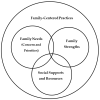Meta-Analyses of the Relationships between Family Systems Practices, Parents' Psychological Health, and Parenting Quality
- PMID: 37754583
- PMCID: PMC10530758
- DOI: 10.3390/ijerph20186723
Meta-Analyses of the Relationships between Family Systems Practices, Parents' Psychological Health, and Parenting Quality
Abstract
(1) Background: Family systems theories include assertations that both personal and environmental factors are determinants of parents' psychological health, well-being, and parenting quality. Applied family systems theories focus on determinants that can be operationalized as intervention practices. The analyses described in this paper focused on the direct and indirect effects of four family systems practices (family needs, resources, supports, and strengths), parents' psychological health (depression, well-being, etc.), and parenting quality (parenting beliefs, involvement, and practices) in families of children with identified disabilities, medical conditions, or at-risk conditions for poor outcomes; (2) Methods: Data from previously completed meta-analyses of the relationships between family systems practices and parents' psychological health outcomes and parenting quality outcomes were reanalyzed. Next, a meta-analysis of the relationships between parents' psychological health and parenting quality was completed to identify which predictors were related to which parenting quality outcomes. Both main effects and mediated effects were examined; (3) Results: The four family systems practices were each related to six different psychological health measures and three parenting quality measures. The six different parental psychological health measures were also related to the three parenting quality measures. The relationships between family systems practices and parenting quality were partially mediated by parents' psychological health; (4) Conclusions: The effects of family systems practices and parents' psychological health on parenting quality were primarily direct and independent. The relationships between family systems practices and parenting quality were partially mediated by parents' psychological health. Future research should focus on the identification of other mediator variables found to be important for explaining the indirect effects of family systems practices measures on parenting beliefs, behavior, and practices.
Keywords: family needs; family resources; family strengths; family supports; meta-analysis; parent involvement; parenting beliefs; parenting practices; parents’ psychological health.
Conflict of interest statement
The author declares no conflict of interest.
Figures
References
-
- Brooks J. The Process of Parenting. 9th ed. McGraw Hill; New York, NY, USA: 2013.
-
- Knauer H.A., Ozer E.J., Dow W.H., Fernald L.C.H. Parenting quality at two developmental periods in early childhood and their association with child development. Early Child. Res. Q. 2019;47:396–404. doi: 10.1016/j.ecresq.2018.08.009. - DOI
-
- Marungruang P., Wongwanich S., Tangdhanakamond K. Development and preliminary psychometric properties of a parenting quality scale. Procedia Soc. Behav. Sci. 2014;116:1696–1703. doi: 10.1016/j.sbspro.2014.01.458. - DOI
-
- Sanders M.R., Morawska A., editors. Handbook of Parenting and Child Development across the Lifespan. Springer; Berlin/Heidelberg, Germany: 2018.
-
- Rubin K.H., Chung O.B., editors. Parenting Beliefs, Behaviors and Parent-Child Relations: A Cross-Cultural Perspective. Psychology Press; Oxfordshire, UK: 2006.
Publication types
MeSH terms
LinkOut - more resources
Full Text Sources
Medical


